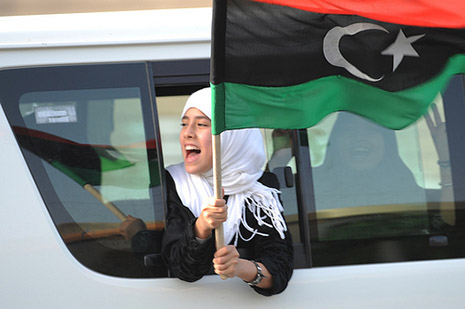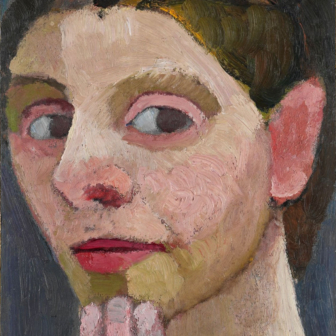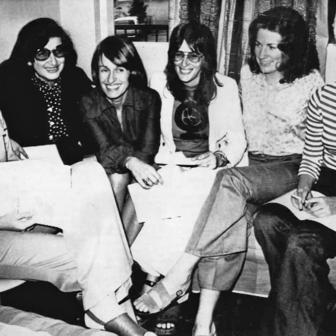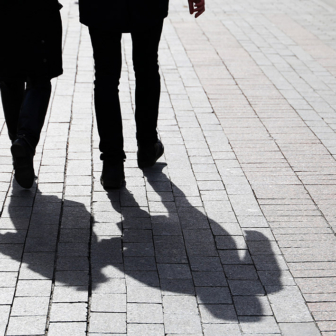ON THE face of it, Libya’s was a very male revolution. Covering the armed rebellion in the east of the country, I came across thousands of young men firing their Kalashnikovs into the air and talking excitedly about the overthrow of Colonel Gaddafi. Their sisters, they told me, were at home. The National Transitional Council, the political body which formed itself in March 2011 to represent the rebels ly, was composed almost entirely of men. Yet, when I returned to Libya last September to research my new book Sandstorm: Libya in the Time of Revolution, I learnt that behind the scenes, women had been playing a crucial and largely unreported role.
Enas Dokali, a twenty-six-year-old computer programmer in the government mapping department, had loathed Gaddafi since, as a little girl, she was taken to visit her uncle in the notorious Abu Salim prison. Alongside more than 1200 other political prisoners, he was killed in a prison massacre in 1996, the signature atrocity of the Gaddafi regime. Most of those killed were Islamist opponents to the regime. Coming from a devout family, Enas’s appearance made her an effective spy for the rebels. In her long coat and headscarf she could walk around town drawing little attention. She noted where military units were based and spotted important regime members going in and out of buildings. The sister of a friend was travelling backwards and forwards to Tunisia taking the information to friends working with the rebels. Enas collected money and clothes to send to the fighters and coordinated shipments of weapons. She and her friends had no secure communications, so they used the mobile phone network and talked in code: an important person was “Mr Chips”; weapons and ammunition were “sandwiches”; videos were “underwear.”
In July, as the uprising reached its final stages, Enas was caught. She spent the last month before Gaddafi was ousted in prison, enduring not only confinement but also sexual abuse, narrowly avoiding rape. She ended up in Abu Salim, where her uncle had been murdered, and was liberated by the rebels as they took the prison. Afterwards, with the support of her family, she decided to go public about her experiences in prison, giving interviews to Arabic TV stations, only to find that for every person who sympathised with her experience there was another who blamed her. “Some people say I took money to go on TV, and that I’m running after fame. Others don’t believe I wasn’t raped,” she said. “But just because you’re arrested you shouldn’t feel shame. Even women who were raped should say so, they shouldn’t be ashamed.”
Yet, in Libya, they are ashamed. Rape is regarded as a dishonour for the family rather than a crime of violence against a woman. Gaddafi was notorious for his retinue of female consorts, including his female guards, whom most of the rest of the population dismissed as prostitutes. A young doctor told me that she had studied medicine alongside Hana Gaddafi, the dictator’s adopted daughter, but had avoided her, not because Hana was unpleasant but because all women feared being invited to Gaddafi’s Bab al Aziziyah compound and catching the eye of the Brother Leader. If that happened, what choice would you have? If you resisted, your brothers and father might be imprisoned. If you acquiesced, the only future was a rapid marriage to one of his henchmen. At least, that’s what everyone feared.
The Brother Leader had idiosyncratic views on women. “It is an undisputed fact that both man and woman are human beings,” he wrote in the Green Book, the document in which he laid out his eccentric political philosophy. He went on to explain in some detail the purpose of menstruation – citing “gynaecologists” as his source – and breastfeeding, which he thought should continue for two years. He was a big fan of children being raised by their mothers at home. “Nurseries are similar to poultry farms into which chicks are crammed after they are hatched,” he wrote, and meandered down a small detour about how the meat of wild birds is tastier than the meat of factory chickens, to prove his point. In the world according to Muammar, a woman does physical work only because “a harsh materialistic society” forces her to, and he railed against anything “which stains her beauty and detracts from her femininity.” Women, he said, “are like blossoms which are created to attract pollen and to produce seeds.”
Yet during the four decades of his rule, and in contrast to many Arab and African countries, women made progress in Libya. Under King Idris, whom Gaddafi overthrew in 1969, less than a quarter of girls went to primary school, but he increased compulsory education from six to nine years, which boosted female literacy from one of the lowest to one of the highest in the region. By the time he was ousted there were more women than men at university. He encouraged women to take up jobs such as teaching, nursing and administrative work but they also became pharmacists, doctors, dentists and sometimes engineers. Traditionally, a Libyan woman joined a man’s family on marriage after the payment of a bride price, and was then largely restricted to the home, but through the 1970s and 80s the old ways started to break down. By the end of Gaddafi’s rule, there were more women in the workforce in Libya than in most Arab countries.
As revolution swept the eastern capital of Benghazi, sisters Salwa and Iman Bughagis, a lawyer and an orthodontist respectively, took positions on the newly formed local council. Iman told me that even the clerics had praised her – in the revolution men and women were working together side by side. Unusually for Libyan women, neither sister wore headscarves. Representing the secular strain in Libyan society, they believed that political and religious freedom would go hand in hand in the new Libya, and that women must be in senior positions. Yet, after the first flush of excitement, they found they were being pushed out. “Iman and I were very effective in the beginning, but the men didn’t think that women could play a role at this time,” Salwa told me in November, as men were starting to jostle for political power. “They didn’t think we had the strength, ability or background.”
On Liberation Day, 23 October 2011, the interim president, Mustafa Abdel Jalil, deviated from the text his speech-writers had provided for his address to the crowd. Libyan law, he said, would now be based on the sharia. The law Gaddafi introduced banning polygamy would be rescinded, for example. It was an idea designed to placate Islamists, who were gaining influence as the politics of the new Libya began to play out, but it appalled secularists. “Is that what we fought for?” asked a young women working for the interim government. “So Libyan men can marry four wives?” A proposal that 10 per cent of seats in a new parliament should be reserved for women was rejected both by those who thought the quota was too small and by those who saw no need for a quota at all. Instead political groupings have agreed to alternate men and women on their party lists; according to the United Nations, which is helping Libya stage elections in June, the “zippered list” system is more effective than quotas, but the danger remains that parties will list the female relatives of powerful men rather than women standing in their own right.
A generation of women who participated in the revolution say there is no holding them back. “We’re involved whether men like it or not,” said Mervat Mhani, who spearheaded a campaign of civil disobedience against Gaddafi in Tripoli. “We don’t need to ask anyone’s permission. The men say we don’t have the experience to go into politics, but they don’t have the experience either! We’ve all been living under dictatorship.” In Libya, as in neighbouring Egypt and Tunisia, Islamists are the most well-organised political force and are likely to gain a majority of seats in any new parliament. The fact that women from Islamist families, like Enas Dokali, participated in the revolution may help but Libyan women are finding that both secular and Islamist men are now trying to edge them out. They will have to fight. •




